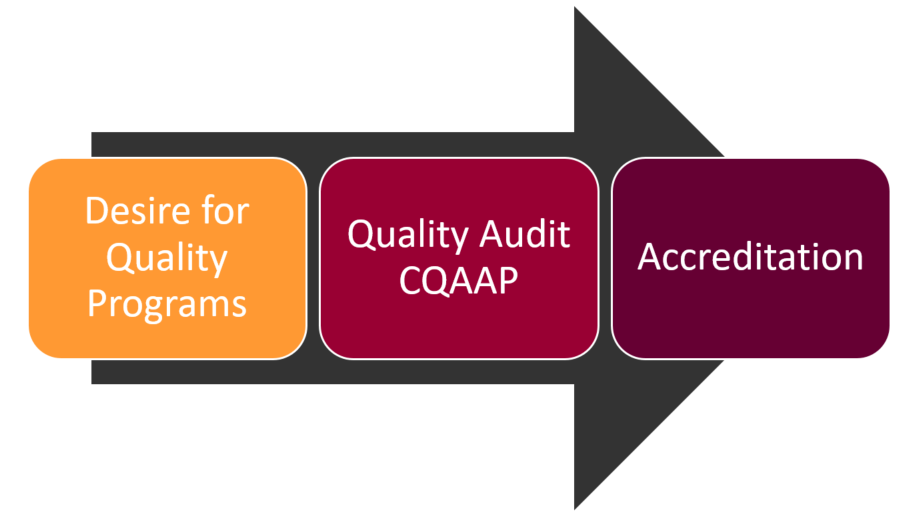2 Context for Quality Assurance: The Ontario Perspective
Learning Outcomes
Examine program quality within the Ontario College System.
- Outline Mohawk College policy.
- Describe the relationship between the Ministry and Ontario Colleges with reference to program quality.
- Define agencies involved with Colleges’ program quality.
“Productivity and efficiency can be achieved only step by step with sustained hard work, relentless attention to details and insistence on the highest standards of quality and performance.” ~ J.R.D Tata
Program Quality at Mohawk College
Program Review process at Mohawk College integrates elements of the College Quality Assurance Audit Process (CQAAP) standards. The review process at the College ensures that all issues of quality are addressed on a regular basis. In order to achieve this, several policies have been developed and committees established or revised to meet these standards. These policies reside on the Mohawk College website and are accessible to the public.
The Program process designed to advance strategic plan and program quality. Mohawk College Program Quality Policy (AS-2000-2013) establishes college framework for the program review process with focus on continuous quality improvement.
The strategic priorities such as Student Success, Graduate Success, Collaboration and Partnership, Community Leadership, and Strong Foundations are assessed in program review, and outcomes to support each priority are developed based on feedback from each stakeholder group.
Purpose of Program Review
Program reviews yield numerous benefits and provide an opportunity to evaluate, analyze, and assess the content, currency, direction, and quality of a program at Mohawk College. The process fosters academic excellence, helps programs to determine how to raise the quality of its offerings, and provides guidance for curricular and administrative decisions in support of continuous program development.
In its strictest sense, program review brings about improvement through the collection of evidence about the quality and effectiveness of programs. Feedback is sought through shared reflections and mutual dialogue about the programs’ current quality and future direction, and through constructive feedback involving all stakeholders.
A variety of college internal and external stakeholder such as students, the program area team, program advisory committees, and industry partners feedback are solicited during the program review process at the college.
Provincial Background
The Ontario government introduced The Colleges of Applied Arts and Technology Act, in 2002. This Act required all Ontario public colleges to implement two elements:
- Quality assurance at the individual college level, and
- A self-regulating process at the system level.
Subsequent to this legislation Ontario College Quality Assurance Service (OCQAS) , the accrediting agency was created to maintain quality assurance processes in Ontario colleges in a self-regulatory environment.
OCQAS is an intermediary between Ministry of Training, Colleges and Universities (MTCU) and Ontario colleges. OCQAS is responsible for:
- Ensuring quality at the program level through the Credential Validation Service (CVS), as well as
- At the institutional level through the College Quality Assurance Audit Process (CQAAP)
It is OCQAS responsibility to oversee consistency of quality across Colleges.
Since 2005 Ontario public colleges with OCQAS, successfully developed a strong, well received, and effective quality assurance system. Although the existing audit model is effective, Ontario colleges continue to experience increasing pressure of the changes in the higher education environment globally. Need for new practices of instructional delivery, improved accountability, and globalization of higher education are only some of the factors that are increasingly influencing the higher education environment in Ontario colleges. To broaden global outreach and to meet the increasing demand for accountability Ontario public colleges decided to explore the adoption of an accreditation model (Ontario College Quality Assurance Service, July 2015).
To read more about the move to Accreditation click here.
Bringing It Back to You
The provincial and institutional perspectives are important, but Program Review has personal | professional benefits for each individual educator. Capturing some of these benefits will help others persevere through the process and understand the value. Add them here:
Introduction to Program Review
In 2002, MTCU provided Ontario College’s greater autonomy with program development, curriculum enhancements and quality assurance through the implementation of the Minister’s Binding Directive for the Framework for Programs of Instructions.
This Framework, explains both Ministry and College responsibilities for maintaining program quality at all credential levels. It includes the credentials framework for Ontario College Certificates (OCC), Ontario College Diplomas (OCD), Ontario College Advanced Diplomas (OCAD), and Ontario College Graduate Certificates (OCGC).
Ministry Requirements
The directive within the Framework for Programs of Instruction outlines specific criteria and processes including a review of all programs of instruction at every Ontario college. The directive indicates that:
“Colleges are to establish mechanisms for the review of their programs of instruction to ensure ongoing quality, relevancy, and currency. A college’s policy on quality assurance for programs of instruction is to be publicly available”.
Credential Validation Service (CVS)
The mandate of the Credential Validation Service (CVS) includes:
- providing reasonable assurance that all programs of instruction, regardless of funding source, conform to the established Credentials Framework and are consistent with accepted college system nomenclature and/or program titling principles; and,
- maintaining the integrity of the credentials and protecting the interests of students and employers who require a reasonable guarantee of consistency and quality in Ontario’s programs of instruction.
CVS approves the program vocational learning outcomes (VLOs) for all proposed programs of instruction. They are also involved in the updating of program standards.
College Quality Assurance Audit Process (CQAAP)
College Quality Assurance Audit Process (CQAAP) is an institutional level process that involves the regular and cyclical review of each college’s quality assurance measures. Program Review is one such measure in place in each college.
Colleges are responsible to maintain the quality of their programs and are audited every five (5) years.
All Ontario colleges are audited based on six (6) standards.
Read more about the above 6 Standards.
Show What You Know
Key Takeaways
To be developed collaboratively with PQ peeps
- First
- Second


